 Antarctica Ice Chime
Antarctica Ice Chime 
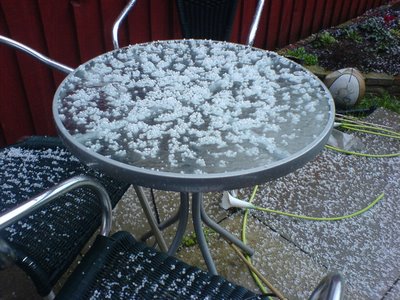 January 1, 2007
January 1, 2007
Cardiff - Wales, United KingdomPhotographer states : Wow, very heavy hail storm, had thunderstroms very high winds liast nite with hail but asmorning the hail was the worse weve seen in about 4 years.I think the biotic damage is fairly obvious there, the lilly won't last the day.

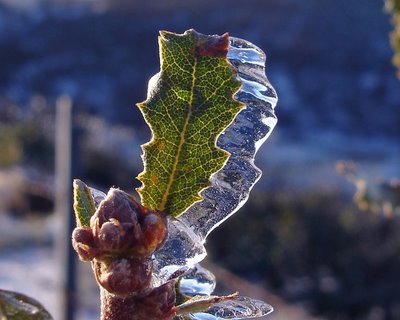 Decenber 29, 2006Mount Laguna, California. This is southern California just north of the border with Mexico that so many people come to illegally.This particular picture clearly illustrates very cold temperature with very high winds. The 'shadow effect' of the ice on the leaf and buds and otherwise accumulated over time and with dynamics that is not conducive to life for this plant, especially the bud/offspring/growth.However, there is an altitude component with an observatory at 4980 feet.Might have something to do with it, but, this is a freeze that normal biota cannot necessarily sustain. By the look of the leaf that could be a type of 'evergreen' that might sustain cold weather, but, not with so many new buds forming as on the base of the stalk and the terminus/top. This is definately damage to a plant that was either blooming prematurely to the effects of Human Induced Global Warming or just unseasonal freezing effecting all the local plants. I would have to look at extended history to know the extent this might be serious and irreversable damage. But, it is definately damage.With plants there are different kinds of growth vs. reproduction. Any hobbiest knows all about plant cuttings and how one can grow two plants from one. That occurs in nature sometimes, but, also what may be at loss and more serious is the opportunity to germinate. In other words, what makes plants/animals more gentically viable is their ability to 'breed' with another individual of the same species. Share genetics/inheritance. In the case of this plant, if there is sginficant damge it might not have the ability to produce seeds that lead to germination. That will reduce the species 'hardiness' and sustainability. This may seem silly to many and making a mountain out of a mole hill, I assure you, it is not. The loss of biota begins nearly under a microscope in cases of Climate Change.
Decenber 29, 2006Mount Laguna, California. This is southern California just north of the border with Mexico that so many people come to illegally.This particular picture clearly illustrates very cold temperature with very high winds. The 'shadow effect' of the ice on the leaf and buds and otherwise accumulated over time and with dynamics that is not conducive to life for this plant, especially the bud/offspring/growth.However, there is an altitude component with an observatory at 4980 feet.Might have something to do with it, but, this is a freeze that normal biota cannot necessarily sustain. By the look of the leaf that could be a type of 'evergreen' that might sustain cold weather, but, not with so many new buds forming as on the base of the stalk and the terminus/top. This is definately damage to a plant that was either blooming prematurely to the effects of Human Induced Global Warming or just unseasonal freezing effecting all the local plants. I would have to look at extended history to know the extent this might be serious and irreversable damage. But, it is definately damage.With plants there are different kinds of growth vs. reproduction. Any hobbiest knows all about plant cuttings and how one can grow two plants from one. That occurs in nature sometimes, but, also what may be at loss and more serious is the opportunity to germinate. In other words, what makes plants/animals more gentically viable is their ability to 'breed' with another individual of the same species. Share genetics/inheritance. In the case of this plant, if there is sginficant damge it might not have the ability to produce seeds that lead to germination. That will reduce the species 'hardiness' and sustainability. This may seem silly to many and making a mountain out of a mole hill, I assure you, it is not. The loss of biota begins nearly under a microscope in cases of Climate Change.
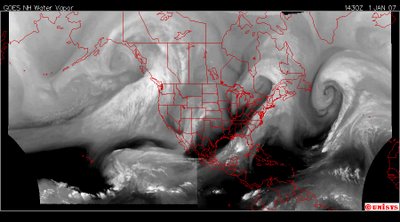 January 1, 20071430z...because....because there is a huge set of upper tropospheric cyclonic winds that are trying to compensate for the lousy mess the people, who remain oblivious to their own sins against nature, of the USA have created for Earth. The upper winds move heat to the Arctic Circle where the Polar Bears are not threatened. That's why. The heat displaces the cold air down to the lower latitudes of Earth. The 'dividing' line of the process is very clear today.Here again it is easily noted that as the vortex in the Pacific moves across the face of the highest carbon dioxide producing nation on Earth it gains velocity and and becomes tighter and more defined as if a hurricane over the Atlantic.
January 1, 20071430z...because....because there is a huge set of upper tropospheric cyclonic winds that are trying to compensate for the lousy mess the people, who remain oblivious to their own sins against nature, of the USA have created for Earth. The upper winds move heat to the Arctic Circle where the Polar Bears are not threatened. That's why. The heat displaces the cold air down to the lower latitudes of Earth. The 'dividing' line of the process is very clear today.Here again it is easily noted that as the vortex in the Pacific moves across the face of the highest carbon dioxide producing nation on Earth it gains velocity and and becomes tighter and more defined as if a hurricane over the Atlantic.

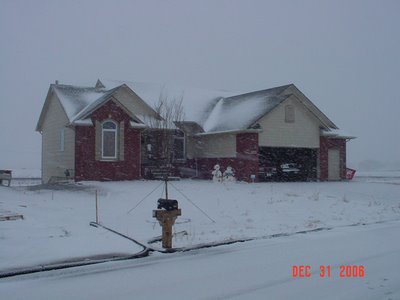 December 31, 2006
December 31, 2006
Wichita, Kansas
Photographer states : After all the snow in Western Kansas, Wichita finally got some on the last day of the year.. Didn't last long though...All that wind and snow is supposed to be north where the Polar Bears live. But. They enjoy it in Wichita and even build snow people. I don't know if leaving the garage door open is simply bragging or reassurance that the photographer can get in out of the weather, but, it is highly energy inefficient. That house sitting on an open plain in Kansas is vulnerable to more heat loss and high energy costs than a high rise in any major city.Weather in Wichita, Kansas (Crystal Ice Chime) is temperate:27 °F / -3 °C Partly Cloudy
Temperature : 45 F / 7 CConditions : OvercastHumidity : 66%Dew Point : 34 F/ 1 CWind : 16 mph / 26 kmh / 72. m/s from the SEPressure : 28.96 in / 981 hPa (Falling)Windchill : 37 F / 3 CVisibility : 10.0 miles / 16.1 kilometersUV : 0 out of 16Clouds : Mostly Cloudy 3400 ft. / 1035 m
Overcast 4100 feet / 1249 m
Above ground level
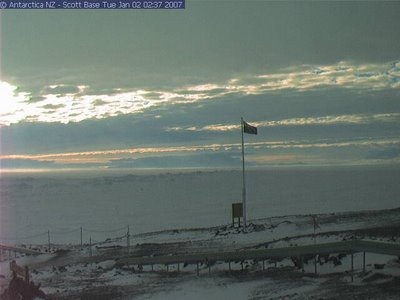 ... well, it is now 2:45 (2:37 in this photo) AM on January 2, 2007 at Scott Base, New Zealand, AntarcticaLots of clouds to seal in the heat against the ice continent.
... well, it is now 2:45 (2:37 in this photo) AM on January 2, 2007 at Scott Base, New Zealand, AntarcticaLots of clouds to seal in the heat against the ice continent.
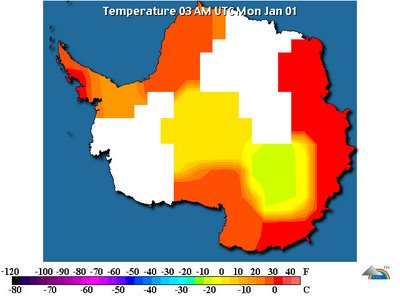 January 1, 2006Antarctica
January 1, 2006Antarctica 







